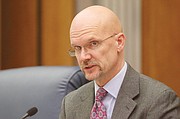$13.5M surplus
That’s what city expects this year after crying money blues
Jeremy M. Lazarus | 10/4/2018, 6 a.m.
Just like last year and the year before, financial officials at City Hall were singing the hardship blues in May in reporting to Richmond City Council that revenues were barely keeping up with expenses. They warned the council not to expect any big surplus.
And just as in those previous years, the same officials are now singing, “We’re in the money.”
In a recent report to City Council, city finance officials noted that it looks like the city ended the 2018 fiscal year on June 30 with a large amount of unspent taxpayers dollars.
This time, Richmond’s surplus is projected to be $13.5 million when the audit of the city’s books is completed in the next few weeks, a Finance Department report to City Council disclosed on Sept. 15. That’s about 2 percent of the approximately $700 million that the council put into the general fund for fiscal 2018. It’s also a bit smaller than the $16.8 million surplus reported last year when the same scenario unfolded.
The biggest question is whether some of that money has to be used for a budget deficit involving the City Attorney’s Office that Mayor Levar M. Stoney’s administration previously neglected to mention.
The mayor is calling on council to allow $3.45 million of the surplus to go to the city’s legal team, but it is not clear that the council is ready to agree.
That amount represents a multiyear deficit that has built up in a special fund. City Attorney Allen L. Jackson taps the fund to pay for four attorneys and three support staff to handle cases of abused and neglected children, foster care, adoptions and other Juvenile and Domestic Relations court issues for the city Department of Social Services.
Mr. Jackson said he was unaware of the fund’s shortfall and said he has never had a problem paying the seven staff members.
However, it appears that the Department of Social Services has not been able to deliver $700,000 to $800,000 to that fund each year to cover the costs of the employees and other legal expenses. It’s not clear why the shortfall developed, though it could relate to changes in state and federal reimbursement for such legal expenses, officials told the Free Press.
City Council has until Oct. 31 to decide whether to give the money to the City Attorney’s Office or wait until the next round of budget deliberations in the spring.
Rejecting the mayor’s request could mean the council might have a larger chunk of the surplus to undertake sidewalk improvements, street paving and other district projects, council members said this week.
The use of most of the surplus is dictated by a formula that City Council and the administration worked out last year.
Fifty percent of the surplus — between $5 million and $6.75 million, depending on the resolution of the special fund issue — must be added to the $118 million in virtually untouchable savings the city has amassed in a bid to gain a Triple A bond rating from New York rating firms.
Another 40 percent of the surplus — $4 million to $5.2 million — must go into the capital improvement maintenance reserve that allows the city to pay for some infrastructure projects rather than having to borrow the money.
City Council would control 10 percent of the surplus — $1 million to $1.34 million.
Mayor Stoney already has proposed ways to spend the council’s share. He wants $726,000 earmarked for as yet unexplained employee compensation and $250,000 set aside for paying for post-retirement benefits for city workers.
He also wants the council to use the remaining $24,310 to cover the cost of his proposal to have GRTC provide free rides on Election Day.
Meanwhile, council members are putting together their own lists of ways to spend the money.
Council President Chris A. Hilbert, 3rd District, is expected to call a special meeting before the October deadline so he and his eight colleagues can settle on how to use the surplus.










